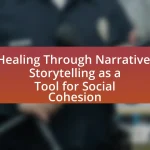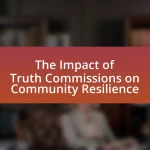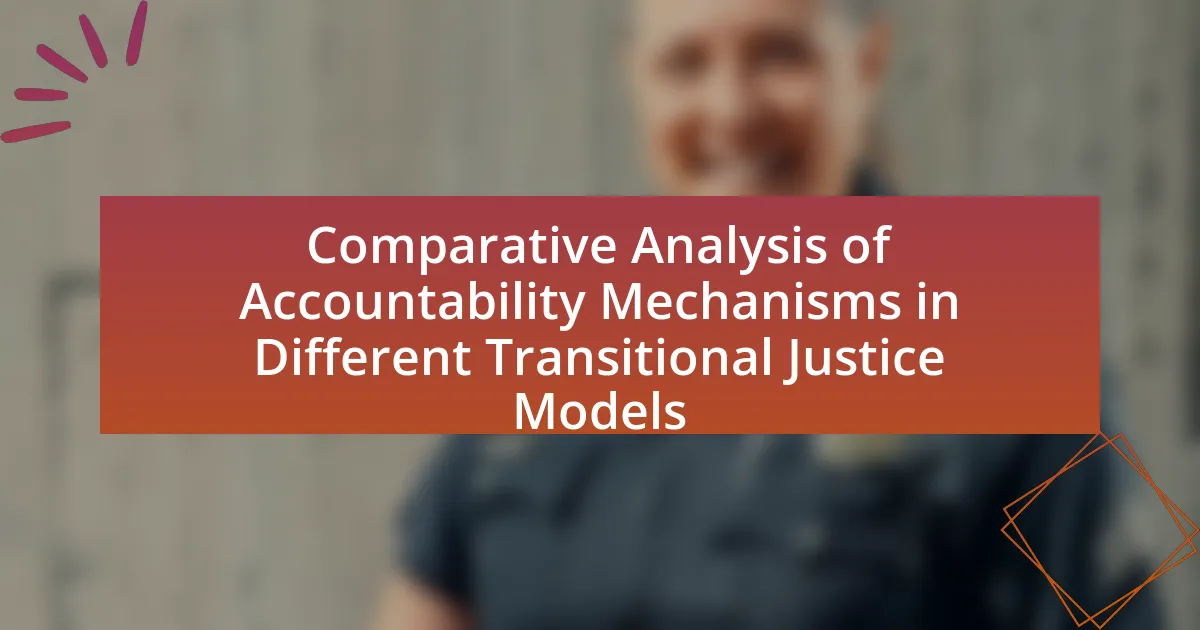Civil society plays a vital role in enhancing accountability mechanisms within transitional justice by advocating for victims’ rights, promoting transparency, and holding state actors accountable. Organizations such as NGOs and grassroots movements serve as intermediaries between victims and the state, ensuring marginalized voices are included in the justice process. They monitor government actions, document human rights abuses, and provide legal assistance, contributing to informed public discourse on accountability. The article explores the specific functions of civil society in transitional justice, the importance of accountability for societal healing, and the challenges faced by civil society organizations in their efforts to promote justice and accountability. Additionally, it discusses the impact of political environments on civil society effectiveness and the strategies that can be employed to overcome obstacles in enhancing accountability mechanisms.
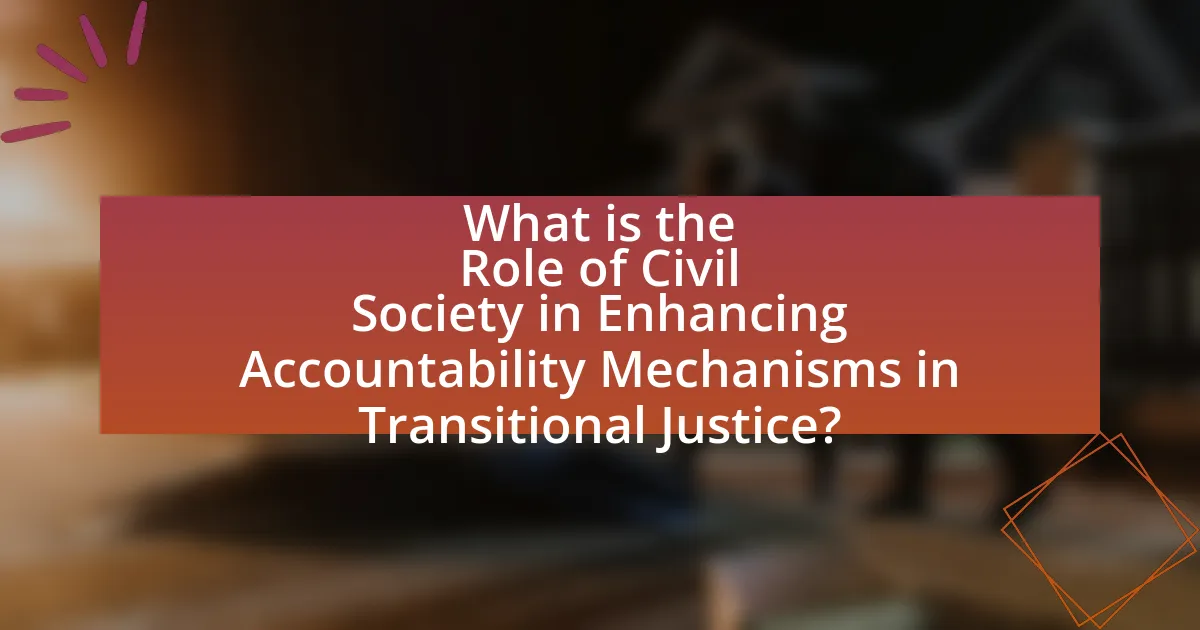
What is the Role of Civil Society in Enhancing Accountability Mechanisms in Transitional Justice?
Civil society plays a crucial role in enhancing accountability mechanisms in transitional justice by advocating for victims’ rights, promoting transparency, and holding state actors accountable. Organizations within civil society, such as NGOs and grassroots movements, often serve as intermediaries between victims and the state, ensuring that the voices of marginalized groups are heard in the justice process. They also monitor government actions, document human rights abuses, and provide legal assistance, which contributes to a more informed public discourse on accountability. For instance, in post-apartheid South Africa, civil society organizations were instrumental in the Truth and Reconciliation Commission, helping to shape its processes and outcomes, thereby reinforcing the importance of accountability in transitional justice.
How does civil society contribute to transitional justice processes?
Civil society contributes to transitional justice processes by advocating for accountability, promoting victims’ rights, and facilitating dialogue among stakeholders. Civil society organizations often serve as intermediaries between affected communities and governmental bodies, ensuring that the voices of victims are heard and considered in the justice process. For instance, organizations like Human Rights Watch and Amnesty International have documented human rights abuses and pushed for legal reforms in various countries transitioning from conflict or authoritarian rule. Their efforts have led to the establishment of truth commissions and reparations programs, which are essential components of transitional justice. Additionally, civil society plays a critical role in monitoring the implementation of justice measures, thereby enhancing transparency and public trust in the process.
What specific functions does civil society serve in these processes?
Civil society serves several specific functions in enhancing accountability mechanisms in transitional justice processes. Firstly, civil society organizations act as watchdogs, monitoring government actions and ensuring transparency in the implementation of justice measures. For instance, organizations like Human Rights Watch and Amnesty International document human rights abuses and advocate for accountability, thereby holding authorities responsible for their actions. Secondly, civil society facilitates public participation by engaging communities in dialogue and decision-making, which fosters inclusivity and empowers victims to voice their needs and experiences. This participatory approach is evident in initiatives where civil society groups organize forums for victims to share their stories, influencing policy outcomes. Lastly, civil society plays a crucial role in educating the public about transitional justice mechanisms, raising awareness of rights and available remedies, which is essential for fostering a culture of accountability. Research by the International Center for Transitional Justice highlights that informed communities are more likely to demand justice and accountability, reinforcing the effectiveness of transitional justice processes.
How does civil society engage with victims and communities affected by conflict?
Civil society engages with victims and communities affected by conflict through advocacy, support services, and facilitating dialogue. Organizations within civil society often provide legal assistance, psychological support, and social services to help victims rebuild their lives. For instance, groups like the International Federation for Human Rights have documented cases where civil society organizations have successfully lobbied for policy changes that address the needs of conflict-affected communities. Additionally, civil society plays a crucial role in documenting human rights abuses, which is essential for accountability in transitional justice processes, as seen in the work of organizations like Human Rights Watch. This engagement not only empowers victims but also fosters community resilience and promotes social cohesion in post-conflict settings.
Why is accountability important in transitional justice?
Accountability is crucial in transitional justice because it ensures that perpetrators of human rights violations are held responsible for their actions, thereby promoting justice and reconciliation. This process helps to restore trust in institutions and fosters a sense of closure for victims and communities affected by past atrocities. Historical examples, such as the Truth and Reconciliation Commission in South Africa, demonstrate that accountability mechanisms can lead to societal healing and the prevention of future violence by acknowledging past wrongs and providing a platform for victims to share their experiences.
What are the key principles of accountability in transitional justice?
The key principles of accountability in transitional justice include truth-seeking, justice, reparations, and guarantees of non-recurrence. Truth-seeking involves uncovering the facts about past human rights violations to acknowledge victims’ experiences. Justice is achieved through legal processes that hold perpetrators accountable, ensuring that they face consequences for their actions. Reparations provide compensation and recognition to victims, addressing the harm they suffered. Guarantees of non-recurrence focus on preventing future violations by implementing reforms in institutions and policies. These principles are essential for fostering trust in transitional justice processes and promoting societal healing.
How does accountability impact the healing process for victims?
Accountability significantly enhances the healing process for victims by validating their experiences and fostering a sense of justice. When perpetrators are held accountable, victims often feel that their suffering is acknowledged, which can lead to emotional relief and a restoration of dignity. Research indicates that accountability mechanisms, such as trials or truth commissions, can provide victims with a platform to share their stories, contributing to their psychological healing. For instance, a study published in the Journal of Peace Research found that societies with effective accountability measures report higher levels of victim satisfaction and lower rates of post-traumatic stress disorder among survivors. This correlation underscores the importance of accountability in facilitating not only individual healing but also broader societal reconciliation.
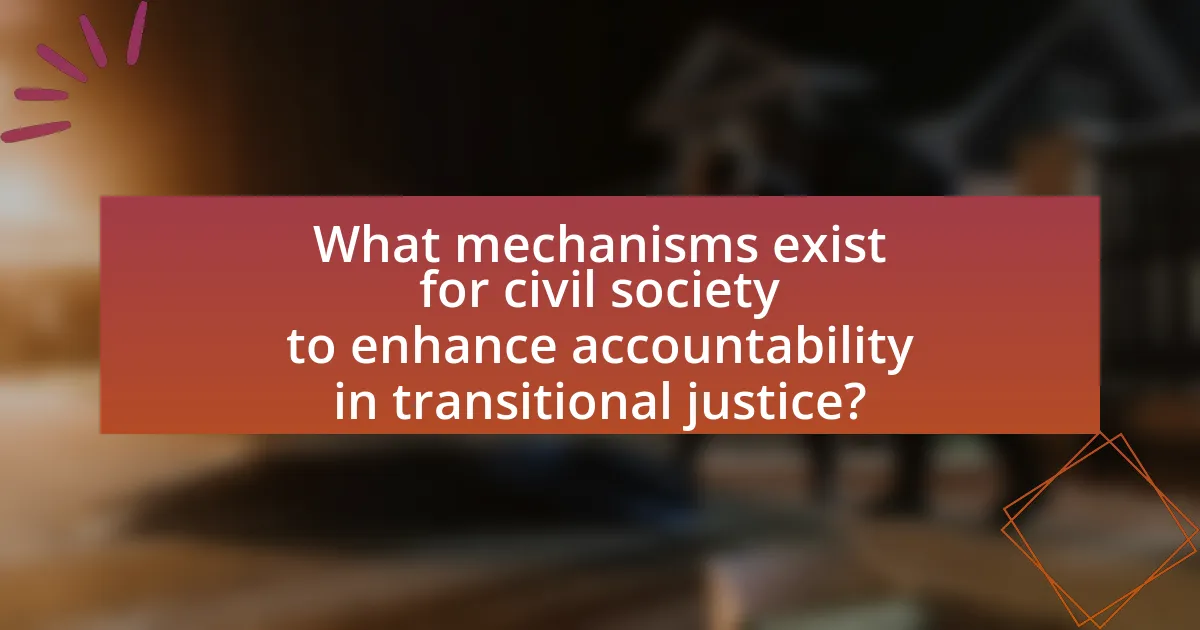
What mechanisms exist for civil society to enhance accountability in transitional justice?
Civil society enhances accountability in transitional justice through mechanisms such as advocacy, monitoring, and participation in truth commissions. Advocacy efforts by civil society organizations raise awareness about human rights violations and push for legal reforms, thereby influencing policy changes. Monitoring mechanisms involve civil society groups documenting abuses and reporting on the implementation of transitional justice measures, which ensures transparency and accountability. Additionally, civil society’s participation in truth commissions allows for the inclusion of diverse perspectives and experiences, fostering a more comprehensive understanding of past injustices. These mechanisms collectively contribute to a more accountable and effective transitional justice process.
How do advocacy and awareness-raising efforts by civil society organizations influence accountability?
Advocacy and awareness-raising efforts by civil society organizations significantly enhance accountability by mobilizing public opinion and pressuring authorities to uphold justice. These organizations often conduct campaigns that highlight human rights violations, thereby increasing visibility and urgency around issues that require accountability. For instance, the work of organizations like Amnesty International has led to international scrutiny and action against governments that fail to address human rights abuses, demonstrating a direct correlation between advocacy efforts and increased accountability measures. Furthermore, studies indicate that civil society engagement in transitional justice processes can lead to more robust legal frameworks and institutional reforms, as seen in post-conflict societies where civil society has played a pivotal role in shaping accountability mechanisms.
What strategies do civil society organizations use to promote accountability?
Civil society organizations promote accountability through strategies such as advocacy, monitoring, and public engagement. Advocacy involves lobbying for policy changes and legal reforms that enhance transparency and accountability in governance. Monitoring includes tracking government actions and reporting on human rights violations, which helps hold authorities accountable for their actions. Public engagement strategies, such as awareness campaigns and community mobilization, empower citizens to demand accountability from their leaders. For instance, organizations like Human Rights Watch and Amnesty International utilize these strategies effectively to influence policy and promote justice in transitional contexts.
How effective are these strategies in different contexts?
The effectiveness of strategies employed by civil society in enhancing accountability mechanisms in transitional justice varies significantly across different contexts. In post-conflict societies, for instance, civil society organizations often play a crucial role in advocating for justice and truth, as evidenced by the success of organizations in countries like South Africa, where the Truth and Reconciliation Commission facilitated national healing. Conversely, in authoritarian regimes, these strategies may face severe limitations due to repression, as seen in Syria, where civil society efforts to promote accountability have been largely stifled. Thus, the context—whether it is a post-conflict environment or an authoritarian state—determines the degree to which civil society strategies can effectively enhance accountability in transitional justice processes.
What role do partnerships between civil society and governmental bodies play?
Partnerships between civil society and governmental bodies play a crucial role in enhancing accountability mechanisms in transitional justice. These collaborations facilitate the exchange of information, resources, and expertise, which are essential for addressing past injustices and ensuring that victims’ rights are upheld. For instance, civil society organizations often provide grassroots insights and advocacy that inform government policies, while governmental bodies can offer legitimacy and access to formal legal frameworks. This synergy is vital for creating transparent processes, as evidenced by the role of organizations like the International Center for Transitional Justice, which emphasizes the importance of inclusive dialogue between these entities to foster trust and promote effective justice outcomes.
How can collaboration improve accountability mechanisms?
Collaboration can improve accountability mechanisms by fostering transparency and shared responsibility among stakeholders. When civil society organizations, government entities, and communities work together, they create a network of checks and balances that enhances oversight. For instance, collaborative efforts can lead to the establishment of joint monitoring bodies that ensure compliance with accountability standards, as seen in various transitional justice contexts where multi-stakeholder initiatives have successfully held perpetrators accountable. This collective approach not only increases the legitimacy of accountability processes but also encourages broader public participation, which is crucial for sustaining accountability in transitional justice settings.
What challenges arise in these partnerships?
Challenges in partnerships between civil society and transitional justice mechanisms include differing priorities, lack of resources, and potential mistrust. Civil society organizations often prioritize community needs and grassroots engagement, while transitional justice bodies may focus on legal frameworks and institutional accountability. This divergence can lead to conflicts in objectives and approaches. Additionally, many civil society organizations operate with limited funding and capacity, which can hinder their ability to effectively engage with transitional justice processes. Mistrust may also arise due to historical grievances or perceived biases, complicating collaboration and undermining the effectiveness of accountability mechanisms.
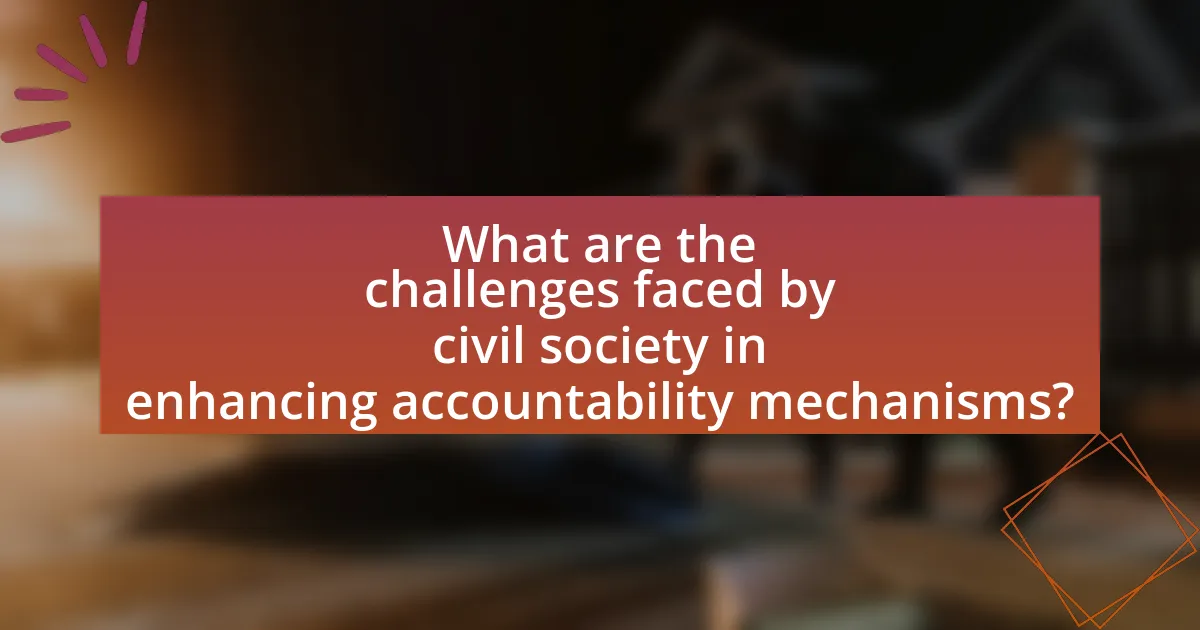
What are the challenges faced by civil society in enhancing accountability mechanisms?
Civil society faces several challenges in enhancing accountability mechanisms, including limited resources, political resistance, and lack of access to information. Limited financial and human resources hinder civil society organizations from effectively monitoring and advocating for accountability. Political resistance often manifests as government pushback against civil society initiatives, which can lead to repression or restrictions on their activities. Additionally, a lack of access to information impedes civil society’s ability to hold authorities accountable, as transparency is crucial for effective oversight. These challenges collectively undermine the capacity of civil society to promote accountability in transitional justice contexts.
What obstacles do civil society organizations encounter in their work?
Civil society organizations encounter significant obstacles in their work, including restrictive legal frameworks, limited funding, and political repression. Restrictive legal frameworks often impose stringent regulations that hinder the ability of these organizations to operate freely, as seen in countries where laws limit foreign funding or impose burdensome registration processes. Limited funding affects their capacity to sustain operations and implement programs effectively, with many organizations relying on inconsistent donor support. Political repression manifests through harassment, intimidation, or violence against activists and organizations, which can deter participation and undermine their efforts to promote accountability in transitional justice. These challenges collectively impede the effectiveness of civil society organizations in advocating for justice and accountability.
How do political environments affect the effectiveness of civil society?
Political environments significantly influence the effectiveness of civil society by determining the level of freedom, resources, and support available for civic engagement. In authoritarian regimes, civil society often faces repression, limiting its ability to mobilize, advocate, and hold governments accountable, as evidenced by the decline of NGOs in countries like Belarus and Russia, where restrictive laws hinder their operations. Conversely, in democratic settings, civil society can thrive, as seen in countries like Sweden, where robust legal protections and funding mechanisms enable organizations to effectively participate in policy-making and promote accountability. Thus, the political context shapes the capacity and impact of civil society in fostering accountability mechanisms in transitional justice.
What risks do civil society actors face in advocating for accountability?
Civil society actors face significant risks in advocating for accountability, including threats to their safety, legal repercussions, and social ostracism. These risks manifest as harassment, intimidation, or violence from state actors or non-state groups opposed to accountability efforts. For instance, according to the 2021 report by Front Line Defenders, 331 human rights defenders were killed globally, highlighting the extreme dangers faced by those advocating for justice and accountability. Additionally, legal frameworks in some countries criminalize the activities of civil society organizations, leading to arrests and prosecutions that stifle advocacy efforts. Socially, civil society actors may experience isolation or backlash from their communities, undermining their support networks and ability to operate effectively.
How can civil society overcome these challenges?
Civil society can overcome challenges in enhancing accountability mechanisms in transitional justice by fostering collaboration among stakeholders, advocating for legal reforms, and promoting public awareness. Collaborative efforts between civil society organizations, government entities, and international bodies can create a unified approach to address systemic issues. For instance, successful coalitions have led to the establishment of independent commissions that investigate human rights abuses, as seen in countries like South Africa post-apartheid. Additionally, advocating for legal reforms ensures that laws align with international human rights standards, which can be evidenced by the implementation of new legislation in various nations following civil society campaigns. Promoting public awareness through education and outreach initiatives empowers communities to demand accountability, as demonstrated by grassroots movements that have mobilized citizens to participate in transitional justice processes.
What best practices can civil society adopt to enhance their impact?
Civil society can enhance their impact by adopting collaborative approaches that engage diverse stakeholders, including government entities, local communities, and international organizations. Collaborative efforts foster shared ownership of initiatives, leading to more effective advocacy and resource mobilization. For instance, the International Center for Not-for-Profit Law highlights that partnerships between civil society and governmental bodies can improve transparency and accountability in transitional justice processes. Additionally, utilizing data-driven strategies to assess community needs and measure outcomes can strengthen the effectiveness of civil society initiatives, as evidenced by the World Bank’s findings on the importance of evidence-based policymaking in enhancing social accountability.
How can international support strengthen civil society efforts?
International support can strengthen civil society efforts by providing essential resources, capacity building, and advocacy platforms. This support enables civil society organizations to enhance their operational effectiveness, engage in policy dialogue, and mobilize communities for accountability in transitional justice processes. For instance, funding from international donors can facilitate training programs that improve the skills of civil society actors, allowing them to better monitor human rights violations and advocate for justice. Additionally, international partnerships can amplify local voices on global platforms, increasing visibility and pressure on governments to uphold accountability mechanisms. Research by the International Center for Not-for-Profit Law indicates that countries with robust international support for civil society tend to have stronger democratic practices and accountability frameworks, demonstrating the positive impact of such support.
What practical steps can civil society take to enhance accountability in transitional justice?
Civil society can enhance accountability in transitional justice by actively engaging in monitoring and reporting human rights violations. This involves documenting abuses, collecting testimonies, and disseminating findings to raise awareness and pressure authorities for accountability. For instance, organizations like Human Rights Watch and Amnesty International have successfully utilized this approach to hold governments accountable for past atrocities. Additionally, civil society can facilitate public dialogues and community consultations to ensure that victims’ voices are heard in the justice process, thereby fostering transparency and inclusivity. By advocating for legal reforms and supporting the establishment of independent judicial mechanisms, civil society can further strengthen accountability frameworks. These actions collectively contribute to a more robust transitional justice process, as evidenced by successful cases in countries like South Africa and Rwanda, where civil society played a pivotal role in promoting accountability and reconciliation.

